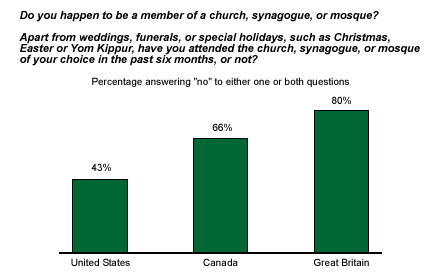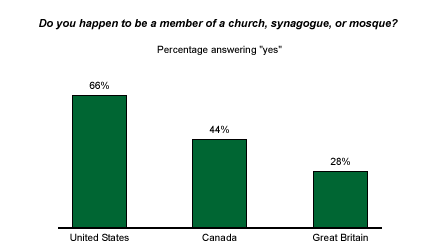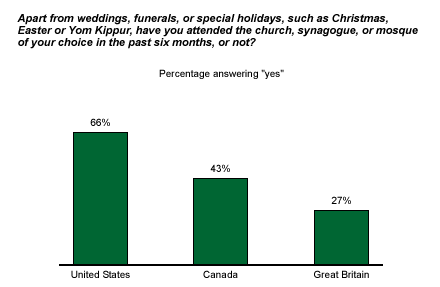Reaffirming what other studies have documented about modern religiosity trends in the United States, Canada, and Great Britain, recent ║┌┴¤═° Polls in those three countries* find far more Canadians and Britons fit the "unchurched" description than Americans do. ║┌┴¤═° defines "unchurched" individuals as those who answer "no" to either one or both of these questions: "Do you happen to be a member of a church, synagogue, or mosque?", or "Apart from weddings, funerals, or special holidays, such as Christmas, Easter or Yom Kippur, have you attended the church, synagogue, or mosque of your choice in the past six months, or not?"
This year, 43% of Americans are "unchurched," compared with 66% of Canadians and 80% Britons.

As among U.S. adults, the likelihood for Britons and Canadians to be unchurched declines with age. There don't appear to be any major population subgroups within either Canada or Great Britain that come close to matching the percentage of "churched" Americans.
Britons, Canadians Also Lag Behind in Membership, Attendance
Which "unchurched" criterion contributes most to the differences among the countries? Actually, the gaps appear about equally large for both questions. In the United States, nearly two-thirds of adults say they are a member of a church, synagogue, or mosque, a figure that has held relatively steady for the past few decades. In contrast, only 44% of Canadians say they are members, and for Britons, the percentage is even lower, at 28%.

Responses to the attendance question follow similar patterns. About two-thirds of Americans (66%) say they have attended a worship service in the last six months, apart from holidays and special occasions. But in Canada, that figure is 43%, and in Great Britain, it is only 27%.

Bottom Line
These data add to a growing body of evidence that Americans are considerably more religiously inclined than either their Canadian or British cousins. In previous ║┌┴¤═° studies, researchers have found that individuals' likelihood to believe in God and to consider religion important in their lives are consistently higher among Americans than Britons and Canadians.
*Results in Canada are based on telephone interviews with 1,005 national adults, aged 18 and older, conducted Aug. 22-31, 2005. For results based on the total sample of national adults, one can say with 95% confidence that the maximum margin of sampling error is ┬▒3 percentage points. The survey was conducted by ║┌┴¤═° Canada.
Results in Great Britain are based on telephone interviews with 1,010 national adults, aged 18 and older, conducted Aug. 26-Sept. 8, 2005. For results based on the total sample of national adults, one can say with 95% confidence that the maximum margin of sampling error is ┬▒3 percentage points. The survey was conducted by ║┌┴¤═° UK.
Results in the United States are based on telephone interviews 921 national adults, aged 18 and older, conducted Sept. 12-15, 2005. For results based on the total sample of national adults, one can say with 95% confidence that the maximum margin of sampling error is ┬▒3 percentage points. The survey was conducted by ║┌┴¤═° USA.
